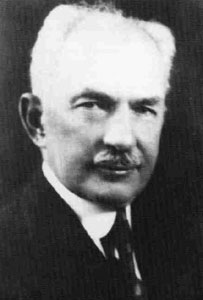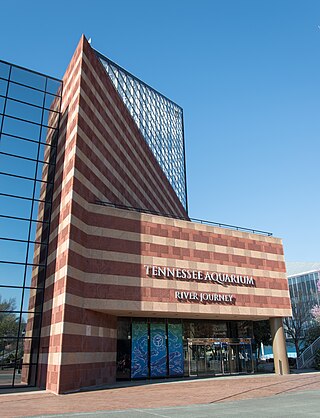
Chattanooga is a city in and the county seat of Hamilton County, Tennessee, United States. It is located along the Tennessee River, and borders Georgia to the south. With a population of 181,099 in 2020, it is Tennessee's fourth-largest city and one of the two principal cities of East Tennessee, along with Knoxville. It anchors the Chattanooga metropolitan area, Tennessee's fourth-largest metropolitan statistical area, as well as a larger three-state area that includes Southeast Tennessee, Northwest Georgia, and Northeast Alabama.

The University of Tennessee at Chattanooga is a public university in Chattanooga, Tennessee, United States. It was founded in 1886 and is part of the University of Tennessee System.

Baylor School, commonly called Baylor, is a private, coeducational college-preparatory school in Chattanooga, Tennessee. Founded in 1893, the school's current campus comprises 690 acres and enrolls students in grades 6-12, including boarding students in grades 9-12. These students are served by Baylor's 148-member faculty, over two-thirds of whom hold advanced degrees, including nearly 40 adults who live on campus and serve as dorm parents. Baylor has had a student win the Siemens Award for Advanced Placement in math and science and a teacher received the National Siemens Award for Exemplary Teaching.

The World of Coca-Cola is a museum located in Atlanta, Georgia, United States, showcasing the history of The Coca-Cola Company. The 20-acre (81,000 m2) complex opened to the public on May 24, 2007, relocating from and replacing the original exhibit, which was founded in 1990 in Underground Atlanta. There are various similar World of Coca-Cola stores in locations such as Las Vegas and Disney Springs.

John Thomas Lupton (1862–1933) was an American lawyer, industrialist and philanthropist who along with Benjamin Thomas and Joseph Whitehead, obtained exclusive rights from Asa Candler to bottle and sell Coca-Cola.

The Tennessee Aquarium is a non-profit public aquarium located in Chattanooga, Tennessee, United States. It opened in 1992 on the banks of the Tennessee River in downtown Chattanooga, with a major expansion added in 2005. The aquarium, which has been accredited by the Association of Zoos and Aquariums (AZA) since 1993, is home to more than 12,000 animals representing almost 800 species.

The Hunter Museum of American Art is an art museum in Chattanooga, Tennessee. The museum's collections include works representing the Hudson River School, 19th century genre painting, American Impressionism, the Ashcan School, early modernism, regionalism, and post-World War II modern and contemporary art.
Benjamin Franklin Thomas (1860–1914) was a Chattanooga, Tennessee, businessman and industrialist who pioneered the development of the Coca-Cola bottling industry and founded the Coca-Cola Bottling Company.
George Thomas Hunter (1886–1950) was a businessman and philanthropist in Chattanooga, Tennessee, who inherited and ran the Coca-Cola Bottling Company empire from his uncle Benjamin Thomas. Hunter grew up in Maysville, KY, but moved to Chattanooga in 1904 to live with his aunt and uncle. Hunter's most notable philanthropic efforts is the creation of The Benwood Foundation and The Hunter Museum of American Art. Hunter Hall at UT Chattanooga was posthumously named in his honor.
Paul Carter (1888–1979) was an American businessman, entrepreneur, and philanthropist in Chattanooga, Tennessee and nearby Lookout Mountain who, along with his father James Inman Carter and brother Garnet Carter, developed most of Lookout Mountain, Tennessee and Lookout Mountain, Georgia. Through marriage to his second wife, Ann Lupton Carter, Paul became the President over a large Coca-Cola Bottling Company territory. The Dinkler Hotel Corporation of Atlanta built the original Lookout Mountain Hotel in 1927; Paul Carter was chosen to run it; the building is now owned by Covenant College and named "Carter Hall" in Carter's honor.
Thomas Cartter Lupton (1899–1977) was an American businessman.
Planning and development in Detroit since the late 20th century has attempted to enhance the economy and quality of life of Detroit, Michigan, United States. In 1970, the private group Detroit Renaissance began to facilitate development in the city. Its successor, Business Leaders for Michigan, has continued to facilitate development into the 21st century. Projects have included new commercial facilities, revitalization of neighborhoods, hospitality infrastructure, and improvements to recreational and public facilities, such as the QLine light rail project.

Andrew Lawrence Berke is an American attorney and politician from Tennessee. He served as the mayor of Chattanooga from 2013 to 2021. A member of the Democratic Party, he represented Hamilton and Marion counties in the 10th district as a state senator from 2007 to 2012. On March 5, 2013, he became Chattanooga's mayor-elect, winning more than 72% of the vote, and he was inaugurated on April 15, 2013. Berke was re-elected on March 7, 2017, and served until April 19, 2021, when he was succeeded by Tim Kelly. On October 6, 2022, President Joe Biden appointed Berke to serve as administrator of the Rural Utilities Service at the U.S. Department of Agriculture (USDA).

Ross's Landing in Chattanooga, Tennessee, is the last site of the Cherokee's 61-year occupation of Chattanooga and is considered to be the embarkation point of the Cherokee removal on the Trail of Tears. Ross's Landing Riverfront Park memorializes the location, which is listed on the National Register of Historic Places.
Summerfield Johnston III, a.k.a. Skeeter Johnston, (1954-2007) was an American businessman and polo player.
John T. Lupton II was an American heir to a Coca-Cola bottling fortune, businessman and philanthropist.
Scott Livingston Probasco, Jr. was an American heir, businessman and philanthropist.
Kim H. White was president and CEO of River City Company in Chattanooga, Tennessee. River City Company is a non-profit organization created in 1986 to aid in the redevelopment and revitalization of downtown Chattanooga. White has been with River City since 2009. Before that, she was president and CEO of the Corker Group and of Luken Holdings. White is a graduate of Hixson High School and the University of Tennessee at Chattanooga. Senator Corker praises White's work as head of River City.

Vision 2000 was a program in Chattanooga, Tennessee, established in 1984 by the nonprofit Chattanooga Venture. The program aimed to reduce city pollution, revive the downtown area, and build more housing. The program also sought to establish businesses and parks that would attract tourists to the city.










